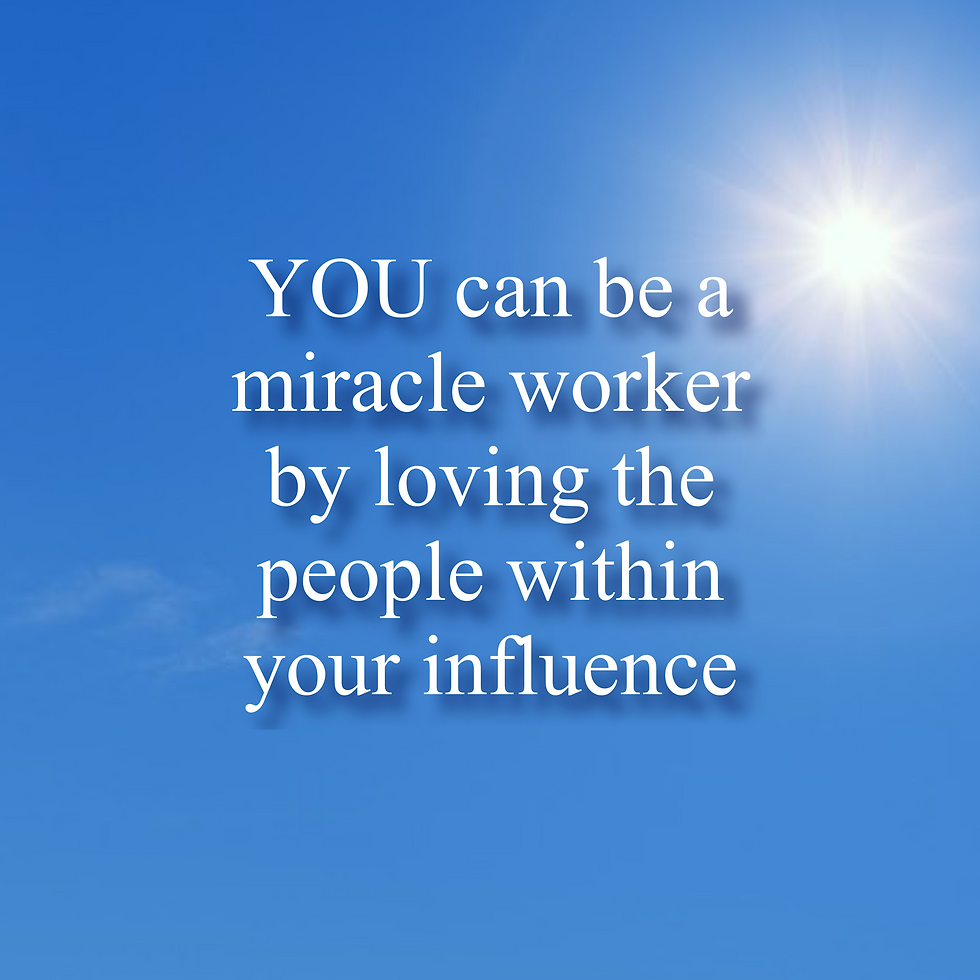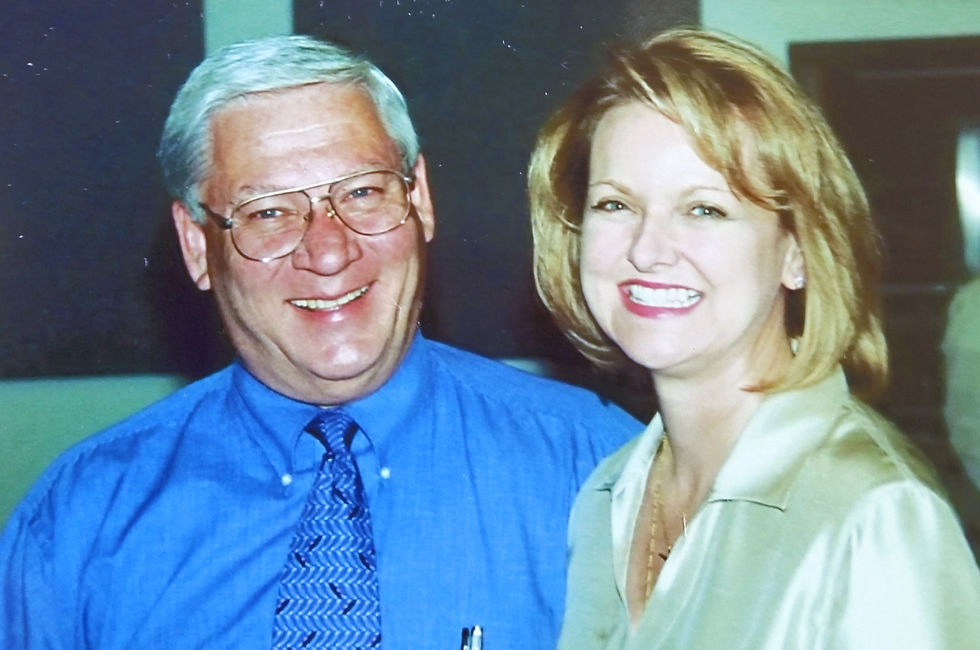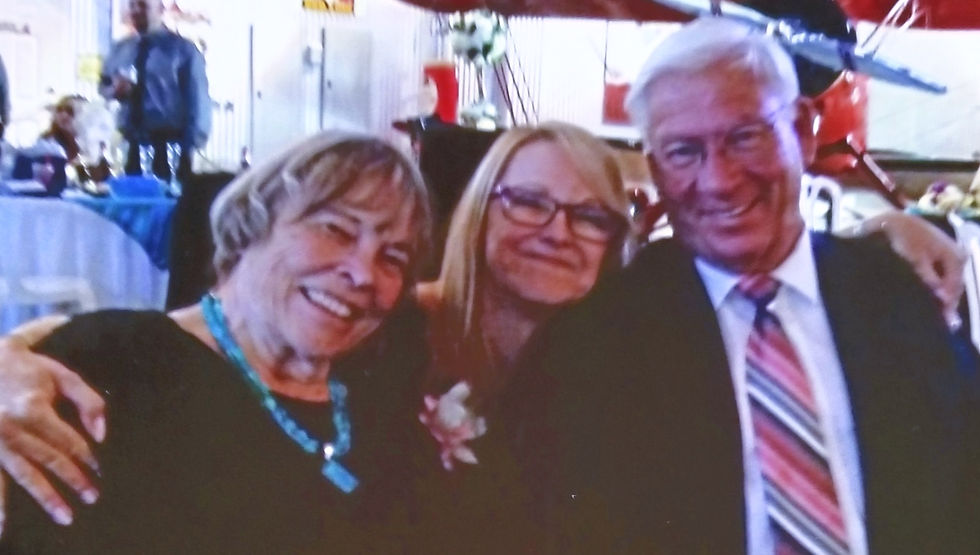Miracle Workers Among Us
- RHONDA SCIORTINO

- Jan 5, 2023
- 14 min read
Updated: Feb 1, 2023
Miracle workers change the world
Some people collaborate with God to make miracles happen. They aren’t the source of the miracle, but they are the ones who are willing to cooperate with God to make miracles happen. Corky Kindsvater was one of those people.

Corky was the CEO of Hillview Acres Children’s Home when I met him in the mid 1980’s. But I didn’t know that because he was out in his plaid shirt with the sleeves cut off cutting the grass on their 5 acre campus. He saw me from a distance as I pulled into their small parking area and started to offload toys and clothes that my daughter had outgrown. Corky shut down the mower and came toward me, and without a word, started helping.
He asked my name and if I wanted a receipt. He talked about some of the children at the home who might like the dolls and things that I had brought. As he spoke of those children, his eyes sparkled as he contemplated the happiness they would experience in getting to rummage through toys that were new to them. Corky’s stories of the children who lived at Hillview pulled me in hook, line, and sinker.
The game that helps heal children through play
Corky told of a game that they had made up called Trove in which the children pulled a slip of paper out of a hole in a box that only fit their little hands so they couldn’t see what was inside. The children had to read the words (or get help in doing so) and do whatever was on that little slip of paper. These tasks could range from 5 jumping jacks to persuading any of the ladies on campus to borrow their lipstick and then getting one of the people in charge to wear it—whether a man or a woman. If the child successfully completed the task, they got to put their hand into another box and pull out another piece of paper. Whatever was on the piece of paper was the prize they had won. The prize could range from a piece of candy to a toy from the closet of toys that had been donated.
Trove taught the children how to safely take risks, how to negotiate with and persuade others, and how to deal with disappointment. Corky told of one little one who had been so severely abused that she was non-verbal when she came to Hillview, but that through the course of playing Trove, she began to speak a few words. Then she began to smile. And the day she got Billi at the front desk to turn over her red lipstick and then talk Corky into wearing it was the day that she first laughed out loud. As Corky told of the healing of that little girl through children’s play, tears welled up in my eyes. As I thought of Corky spending the rest of the afternoon with bright red lipstick smeared on his lips by that little girl, I found myself laughing and crying at the same time.
I had to get back to work, but I knew I’d be back. I couldn’t get over how knowledgeable that gardener was.
Healing children by giving them a safe outlet for anger

It wasn’t long before I learned that the gardener was the CEO and that he and his wife, Gayle, lived in one of the houses on the property. They called the houses “cottages,” and I learned that Corky and Gayle had lived in a children’s home cottage for almost their entire marriage. I learned that Corky had felt God’s call to give up the chain of auto parts stores he owned to give his life fully to the healing of God’s most vulnerable children. He went back to school and earned his master’s degree in social work.
Gayle was a teacher who willingly gave up her public school teaching to teach and care for the children at Hillview who had been severely traumatized and educationally delayed. The children who came to her classroom hyper-vigilant, ready at any moment for their worst possible nightmare to become a reality, began to relax and play and enjoy learning something other than survival. Gayle’s joyful personality, patience and sense of humor were exactly what those children needed.
Every time I dropped in at Hillview Acres I would see children who were in various stages of healing and thriving. I met remarkable people who were fully committed to doing whatever it took to love those wounded children into wholeness. And I heard stories from Corky. He was never without a story.
He told of the little boy who would break windows when he got angry, and every time a window would break, it would cost several hundred dollars to replace—money they didn’t have. Corky knew that the child had so much anger in him about the horrendous things that had been done to him, and he wanted to find a safe way for the boy to express his anger to get it up out of him. After some prayer and thought, Corky purchased a bunch of small, handheld mirrors and a couple of pairs of swim goggles. He set up a special place for the boy to safely break a mirror when he felt angry. He explained to the boy that from now on, he didn’t have to break a window anymore because he had his own special place to let his anger out. All he had to do was find Corky and tell him that he felt angry. He did that a couple of times and no longer felt the need to break anything.

Emotional healing with chocolate pudding?
On another visit to the children’s home, Corky told of the little boy who’s mother had punished him for pooping in his pants by forcing him to wear his dirty underwear on his head to school. By the time severe abuse had resulted in the boy being removed from his mother, he was regularly defecating and smearing it on the furniture, walls and whatever else was within reach. Corky told how foster home after foster home and kicked the child out, but that no child was to ever be kicked out of Hillview Acres Children’s Home as long as Corky was there!
Corky prayed and asked God how to help heal this boy, and he got the idea to clean out the pantry of the cafeteria which was paneled in stainless steel and had a drain in the middle of the floor. He took the little boy to the room where he had placed a folding table and a big stainless steel bowl and a box of chocolate pudding. He and the boy mixed up the pudding, and Corky told him that he could throw it, smear it, or eat it. He was allowed, in that room only, to do whatever he wanted to do with the chocolate pudding. The two of them proceeded to have a chocolate pudding fight. By the time the two emerged from that room, they were covered from head to toe in chocolate pudding. They were laughing and joking, and Corky was heard telling the boy that anytime he felt like he wanted to do the “other thing” that he used to do, to come find Corky any time of the day or night, and they’d go in and have another chocolate pudding session. Just like the little boy who broke windows, there were a couple more chocolate pudding sessions, and the child who defecated in the house no longer felt the need to do that. He began to make friends and have fun. He learned how to laugh and play. He began to thrive.
There are hundreds of stories of children who entered Hillview wounded to the core of their souls but who left happy and hopeful for their good future. And there were many more stories of the adults who were healed by Corky & Gayle’s influence. Mine is one.
Miracle workers change the trajectory of your life
One of the times that I stopped by Hillview, Corky was more serious than usual. The sparkle in his eyes that constantly scanned the vicinity for children always gave me the feeling that ANYTHING might happen—like a child running in and whispering in Corky’s ear to please please put red lipstick on. But one day Corky’s sparkle was subdued. He told how he had received news that their insurance premium was going from $12,000 to $64,000. They didn’t have the money, and Corky was sure that they wouldn’t be able to raise it because no one wants to donate money that isn’t going to be spent directly for the care of the children. He told me that if they couldn’t find a solution to this problem, the board had voted to close the children’s home after over 75 years of caring for children. Then he asked me a question that changed the trajectory of my life, “didn’t you say that you’re in insurance? Is there anything you can do?”
I went back to work that afternoon with a determination that I’d never had for insuring wholesale food companies, hair salons or residential care facilities for the elderly in which the insurance agency I worked specialized. I walked in and walked straight back to the office of the founder of the agency, Fred Livermore. He was at the end of his career, preparing to sell his agency and retire. He had come home from WWII with nothing and had, through sheer grit, built a large, well-respected insurance agency. He had given me a chance when women weren’t insurance agency producers. He and his wife mentored me, and I worked hard to be worthy of the opportunity I had received. When I told Fred that the home for abused children was going to close if we couldn’t help them, he shifted into gear. He started making calls and calling in favors, and before long, I was back at Hillview Acres letting Corky know that the insurance that was mandated by law to maintain their license would continue uninterrupted at a premium they could afford.
It wasn’t long after that when I received a large envelope from Hillview. I emptied the envelope out on my desk at the insurance agency and saw note after note from the children thanking me for what I had done to let them keep living there. Along with colored drawings, poems and thank you notes was a card from Corky and Gayle Kindsvater thanking me for “keeping the doors of the children’s home open.” It was then that I heard the voice of my foster father from twenty years prior, a voice I had forgotten, saying, “young lady, you were put here for a reason, and you better be about finding out what it is.” I hadn’t thought of those foster parents in years. I had begun to question the reality of those vague memories. But in that moment at my desk at Livermore Insurance, I knew that I had found the reason I was born. I was supposed to protect and defend the good people and organizations that care for children who have been abused.
Miracle workers make it OK to be yourself
Over the years that I would drop by Hillview, Corky deduced that I had experienced a traumatic childhood. I had worked hard to hide the wounds of abandonment and abuse. I had never told anyone about it. I was ashamed that my parents didn’t want me and that the people who raised me said they wished I’d never been born. Corky saw through the carefully erected facade, but instead of shunning me, he accepted me. He made it OK to be me. He told me that my personal experiences were why I cared so deeply and worked so hard to accurately protect child welfare organizations and by extension, the children entrusted to their care. With Corky, the abandonment and abuse of my childhood was not a negative reflection of me, but rather, it was a badge of honor. I had successfully survived.*
After Fred Livermore retired, the new owners of the insurance agency didn’t want to insure children’s homes. I was dejected. How could I fulfill my purpose with an employer that forbade it? I went to see Corky. He listened quietly and then asked, “why don’t you open your own insurance agency?” I didn’t know anything about running a business, but if Corky thought I could do it (by then I thought he knew everything), I knew I couldn't fail!
Miracle workers nudge you in the right direction
I was 27 years old when I tendered my resignation, downsized from my house to a condo, traded my Mercedes for a Subaru, sold my furniture and started Human Services Insurance. I dedicated the next 21 years to insuring child welfare organizations and analyzing the ways that children and caregivers get injured or killed in out-of-home placement.
To help me do that, Corky and his colleague Cal Towler (often referred to as "the maintenance man"--not for maintaining the buildings and equipment but for helping to fix broken hearts) created a computer program that helped me connect the dots between caregivers to child ratio, educational levels of caregivers, trainings, types of injuries, days of the week and hours of the days when kids got hurt. With that information, we helped child welfare providers keep kids safer and raise their standards of care. Corky also helped me use the information about claims in child welfare organizations to create caregivers trainings that were designed to prevent similar tragedies. Whatever good my team and I did in those 21 years is because Corky believed in me and was always willing to help.
Miracle workers help you change the world
As a result of Corky’s invaluable assistance, the child welfare organizations we protected experienced fewer claims than the national average. That means fewer children who were injured or killed and fewer caregivers who were injured, which translated into lower turnover, which can be extrapolated out to longer relationships between caregivers and children, and as Corky always said, “RELATIONSHIP IS EVERYTHING.”
Corky believed, and taught everyone within his influence, that relationships are everything, beginning with our relationship with God, family, friends, and everyone who crosses our paths. When I met Corky and Gayle, I was afraid of relationships because people had always hurt me. I expected to get hurt, so I was strongly defended against anyone being able to get close enough to hurt me. Through Corky I learned that bad relationships harm us but good relationships heal us. That simple concept made sense to me, so I began to let others into my life. Because of Corky recommending me to his vast network of friends who were Christian child welfare administrators throughout the US, not only did my business grow exponentially, but so did my relationships with wonderful Christians who had given their lives to the care and healing of children who had been severely abused. Through Corky and his friends, some of the best people on earth, I personally experienced that it is possible to be loved into wholeness.
Here's a quick video on how YOU can be a miracle worker too!
Miracle workers leave a legacy
It’s been nearly 40 years since that first meeting with “the gardener” at Hillview Acres. Through those years, Corky intentionally made time to cut the grass, unstop backed up toilets, and many other seemingly menial tasks because he believed that he made more progress with kids out on the grounds than he did in the office. He showed through his actions how to make right choices, forgive those who mistreat us, and put the needs of others before their own. Hillview ultimately closed their doors forever, not through any fault of their own, but because of the way that the US looks down on congregate care of children. The closing of Hillview broke Corky and Gayle’s hearts, but their faith in God sustained them. And on Christmas Eve 2022 Hildrith Henry “Corky” Kindsvater went to be with Jesus. Gayle told me that she hopes to join him soon. After over 60 years of marriage, life here without Corky will be hard.

Corky left a legacy that cannot be measured. In addition to creative solutions to behavioral problems and creating intentional opportunities to learn through play, during his years of loving children into wholeness he and Cal created a software program that tracked the behaviors of children and connected the dots between triggers and outcomes so that caregivers could anticipate that a court date or a visit from mom could result in angry outbursts, nightmares or bed wetting. By anticipating predicted outcomes, they could give extra care to those who most needed it before behaviors escalated. This system of anticipating what was predictable helped keep children and caregivers safe.
Corky shared what he knew with many other child welfare organizations all over the US. They created many caregiver training programs, one of which was called, RELATIONSHIPS ILLUSTRATED, in which he gave examples of what it takes to heal broken hearts through relationships. One of the most profound things Corky taught was
"Every bad behavior is a statement or a question. Although it may be poorly articulated, the statement is always, “Nobody loves me,” and the question is always, ‘Do you love me? Will anyone ever love me?’” —H.H. “Corky” Kindsvater, MSW
Hundreds of adults who were cared for as children by Corky and Gayle (and at least one insurance agent-turned-child advocate-turned author) are out in the world living good lives, enjoying healthy relationships, and doing our best to help others. For us, the cycles of abuse have been broken. We are healed and whole, and our children are better parents than we were, and their children will be even better still. When you do the math on the spouses and families and employers and co-workers and neighbors and everyone else whose lives are better because of us adults who were loved into wholeness by Corky and Gayle, the number of lives improved is in the thousands. Add to that the children who weren’t injured or killed in out-of-home placement because of the tragedies that were averted through Corky’s work in risk management, and the number of people touched is beyond our reach.
There are many other beautiful souls in the world who, like Corky and Gayle, have dedicated their lives to caring for children who feel unwanted and unloved. These are the people who change the world when they change the life of one child. If you are one of them, God bless you and everyone within your influence. If you’re blessed enough to meet one of them, do what you can to help them, and the love that will come back to you will enrich your life in ways you can’t imagine.

Hildrith Henry Kindsvater was Corky’s adopted name. Kindsvater literally means “father of many children.” He surely lived up to that name in the parenting of his two daughters and his son, their families and in the lives of everyone he knew. I am forever grateful for Corky and Gayle and for the precious couple, Mr. & Mrs. Kindsvater, who paid $2.50 at the cafeteria cash register of the hospital where they adopted their Corky. All are miracle workers.
This is a picture of my 50th birthday when Corky violated his "no-dance-rule" to give me my first father-daughter dance. I learned later that he took dance lessons to be able to give me this priceless gift that I will cherish until my last breath.
I write about what I have learned from the wonderful people who have taken the time to invest in me. What I've received from these people, who are some of the best on earth, is priceless. If any of this helps you, please subscribe and share with others.
*Because Corky believed in me, I began to believe in myself. His belief in me helped me to reframe my thinking about myself from "damaged goods" to a strong, resilient survivor. As a result, I founded Successful Survivors Foundation to encourage, educate and empower other survivors to see themselves for who they truly are. To help others find their survivor characteristics, I wrote Successful Survivors, the 8 character traits of survivors and how you can attain them.
Here’s an excerpt from an article I wrote about Corky in Foster Focus Magazine many years ago:
I’ve thought about [Corky’s] wisdom in relation to my own experiences, the dumb things I did when I was younger (like putting down the garage door on my then boyfriend/now husband’s prize possession car), the interactions between kids and caregivers, and now in connection to foster kids being trafficked. A kid who has been abandoned, abused, neglected, and otherwise mistreated will, in some way, ask if foster parents love her, if extended family of the foster parents love her, if teachers love her, and if friends love her. And if, in the faces of all those people, the kid feels that the answer is “NO,” she is far more susceptible to the trafficker who says the things she longs to hear.
You can read the entire article here: https://www.fosterfocusmag.com/articles/nobody-loves-me
This podcast will help you find and live your purpose and enjoy the peace and joy that accompanies it. Subscribe now and share this with a friend. Find Your Purpose Now is available on Apple Podcasts, Google Podcasts, Spotify, Iheartradio, Amazon music, Overcast, Castbox, Pocket Casts, Radio Public, and right here at www.rhonda.org/podcast.


















Comments